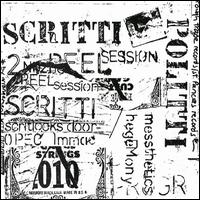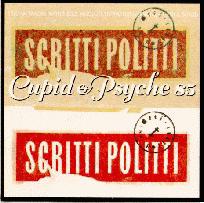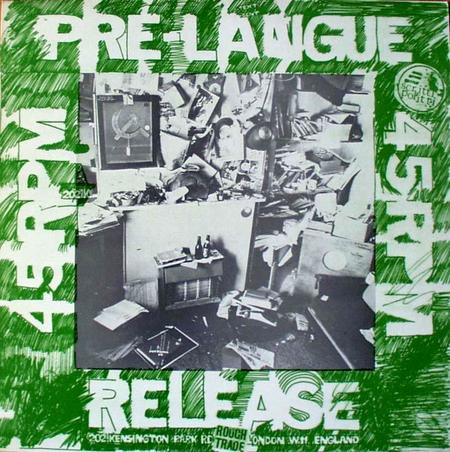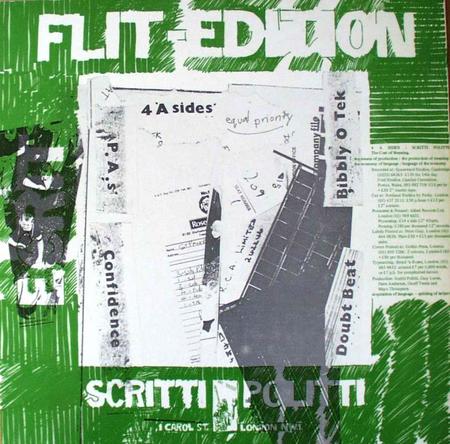March 25, 2005
Lions after slumber, or What is sublimation today?

'In post-liberal societies ... the agency of social repression no longer acts in the guise of an internalized Law or Prohibition that requires renunciation or self-control; instead, it assumes the form of a hypnotic agency that imposes the attitude of "yielding to temptation" - that is to say, its injunction amounts to a command: "Enjoy yourself!" Such an idiotic enjoyment is dictated by the social environment which includes the Anglo-Saxon psychoanalyst whose main goal is to render the patient capable of "normal", "healthy" pleasures. Society requires us to fall asleep into a hypnotic trance...'
- Zizek, 'The Deadlock of Repressive Desublimation', in The Metastases of Enjoyment, 16
As we awake from the dreary dream of entryism, we can start to see that what kept us slumbering in the last twenty five years was indeed a programme of controlled, if not quite repressive, desublimation.
No doubt, the signs of any awakening are fitful as yet. In pop, they are perhaps most evident in a groping backwards, a paradoxical return to modernism. Could it be that the likes of Franz Ferdinand and The Rapture will prompt a self-overcoming of the very postmodern revivalism of which they are a symptom? Just now, Rip it up and Start Again sounds like a uncannily timely injunction.
Something seems to be (re)coalescing, as the reception of the Early Scritti LP (including Simon's piece in Uncut) indicates.
For those Inside - not least, of course, Green himself - these recordings must be dismissed as inept avant-doodlings, embarrassing juvenilia. It seems plausible to attribute Green's less-than-lukewarm judgements on the early Scritti material less to modesty, still less to a 'maturity', than to a defensive cleaving to a once-successful strategy that has now run its course, as Marcello acidly noted in his acerbic comparison between the indifferent reception of the last Scritti album and the eagerness with which Early has been anticipated :'when you next find yourself at a motorway service station, feel free to browse through the plentiful copies of his 1999 up-to-the-1999-minute-Mos-Def-involving Anomie and Bonhomie album, yours for just £1.99 - whereas the new collection of his scratchy, disjointed post-punk improv stuff from two decades ago reportedly already has 10,000 advance orders.'
Scritti were the most successful - aesthetically, commercially - of the post-post-punk entryists (the likes of U2 being always-already included of course). In the desolate gloss of mid-late 80s pop, Scritti's hyper-saccharine sweetness retained a plaintive if sickly gorgeousness, even if their vaunted deconstructive swerves became subtle to the point of invisibility. But the fastidious precision of that striplit eighties production has dated (late eighties chartpop is the most time-bound pop music ever - discuss) much more damagingly than has the messthetic of the early records. Whereas the conspicuous completeness of Eighties Entryist Pop repels fascination, the queasy, uneasy Unfinishedness of postpunk pop - the lurching 'doubtbeat' of a collectivity discovering itself - is uncannily compulsive. In punk cut and paste, the joins, the cuts (in other words the ways in which any world does not coincide with itself) are flaunted and foregrounded. Entryism is the capture of cut and paste into photoshopped seamlessness.

What is perforce lost in today's postpunk revivalists is the literal in-tensity of this sound: how it is in Kierkegaard-Zizek's terms, in becoming. It doesn't know anything (it certainly can't be confident that it is a 'classic independent rock sound' in the way that Franz Ferdinand are). In flight from rock's 'condition of possibility', this undo (it) yourself pop puts into question ALL conditions of possibility, and with them the very concept of conditions of possibility. What is this if not the sound of the Badiou Event, which is the punk revelation itself: this is happening, now, but it can't be, it's Impossible....? ...
Scritti were possibly the least Dionysian pop group ever. In the early days, the methodology may have been improvisational, but the group didn't want anyone (least of all themselves) to be under the illusion that it issued from some vitalist wellspring of creativity. It was the sound of a collectivity thinking (itself into existence) under and through material constraints. The famous displaying of all the recording costs on the sleeve was demystificatory but not desublimating. What is too often missed about any punk that matters in fact, is that sublimation, far from requiring mystification, is alien to it.

As Alenka Zupancic argues, mysification is entirely on the side of the reality principle (and one of the greatest contributions psychoanalysis has made to politics is to identify 'realism' precisely with a reality principle, so that what counts as 'commonsense' can be exposed as an ideological determination):
'The important thing to point out ... is that the reality principle is not some kind of natural way associated with how things are, to which sublimation would oppose itself in the name of some Idea. The reality principle itself is ideologically mediated; one could even claim that it constitutes the highest form of ideology, the ideology that presents itself as empirical fact (or biological, economic...) necessity (and that we tend to perceive as nonideological). It is precisely here that we should be most alert to the functioning of ideology.' (The Shortest Shadow, 77)
Listen to what Marcello calls the 'pseudo-moronic chants of platitudes ("An honest day's pay for an honest day's work! You can't change human nature! Don't bite the hand that feeds!"' of Scritti's 'Hegemony' and it is clear that this message has got through. It is the denunciation and exposure of the great ideological swindles that are liable to be remembered about punk, but this destructive urge (passive nihilsm) is empty without its active complement: the production of a new space. It is no accident that mystificatory realism has allowed us to remember the former but not the latter, since the mere dismantling of ideological presuppositions quickly became a dreary academic parlour game associated with a dessicated, depressive and depressing Left (they want to take your enjoyment away from you....)
Zupancic labels the production of this new space 'sublimation'. To understand why this she makes this move entails differentiating sublimation from the sublime as such. The postmodern emphasis on sublimity has tended to stress the sublime as an unreachable beyond, contemplation of which induces a pathos of finitude in any human subject. To think about sublimation, the process by which an object 'acquires the dignity of the Thing', produces a different emphasis. As Zupancic continues:
'the Lacanian theory of sublimation does not suggest that that sublimation turns away from the Real in the name of some Idea; rather, it suggests that sublimation gets closer to the Real than the reality principle does. It aims at the Real precisely at the point where the Real cannot be reduced to reality. One could say that sublimation opposes itself to reality, or turns away from it, precisely in the name of the Real. To raise an object to the dignity of the Thing is not to idealize it, but rather to "realize" it, that is, to make it function as a stand-in for the Real.'
Sublimation is thus related to ethics insofar as it is not entirely subordinated to the reality principle, but liberates or creates a space from which it is possible to attribute certain values to something other than the recognized and established "common good." ... What is at stake is not the act of replacing one "good" (or one value) with the same planetary system of the reality principle. The creative act of sublimation is not only a creation of some new good, but also (and principally) the creation and maintenance of a certain space for objects that have no place in the given, extant reality, objects that are considered "impossible."'
What was the 'beyond good and evil' of Scritti, Gang of Four, the Pop Group and the Raincoats if not the production of just such a space? (As Lacan wryly notes, when we idly think of someone who is 'beyond good and evil' we are liable to think of someone is merely beyond 'good'.) This entails not an austere asceticism but the engineering of new forms of enjoyment. The early Scritti's 'difficulty' places them beyond the pleasure principle, for sure, but we succumb to an ideological lure if we think that this puts them beyond enjoyment too. As Savonarola said to me a few weeks ago, Gang of Four were far more effective at turning out compulsive pop songs than almost any of today's chart act you could care to name. The same goes double for Early, whose songs are catchy because they refuse to push familiar buttons.
Entryism constitutes a double disavowal of sublime space. First, it is turned away from, then the very possibility of its existence is denied. In retrospect, entryism has to seen as the production of a particularly virulent capitalist mind plague. How else to acount for the absurd convolutions that allowed Green to posit some political continuity between the avant-Marxism of the early years and the champagne-swigging meta-boyband-cum-yuppie-corporation 'hammer and popsicle' posturing (check some of those pics which illustrate Simon's piece) of the chart Scritti? As Simon has shown elsewhere, Green had by this point done more than merely accommodated himself to the market; he was acting as an entrepraneur, since the 'Fairlight future-funk' of Cupid and Psyche 85 was so far ahead of the game it actually influenced black pop.' There's a case for saying that Cupid and Psyche's 'dazzling, depthless surfaces' in which '"soul" and interiority are abolished' and 'desire traverses a flat plane, the endless chain of signifiers, the lover's discourse as lexical maze' was THE sound of eighties capital, the perfect soundtrack to Jameson's Postmodernism, or the Cultural Logic of Late Capitalism, what if felt like to be lost in the mirrored plateaux of the hypermarket.

Realism always poses as maturation. Of course it is acceptable, understandable and inevitable to have silly youthful dreams, but there comes a time when one must put aside such childish things and face reality; and reality is always defined 'biologically', in terms of the imperatives of reproductive futurism, and 'economically', in terms of the 'constraints' of the capitalist anti-market.
Readers of the lamented but never forgotten Pillbox may remember a letter Penman received from Brian Anderson of the neo-Conservative City Journal. Anderson's account of the intellectual provenance of neo-conservatism - many neo-cons were tellingly described as disappointed, disillusioned leftists who had been 'mugged by reality' - concluded with the following convergence between New Pop entryism and his own neo-conservative turn:
'Also - and this will probably horrify you-my move right came partly thanks to Ian Penman and Paul Morley at NME! Your rejection of overly politicized agitprop in music back in the late seventies made intuitive sense to me - I disliked the didacticism of Billy Bragg or Crass, and could stomach even less the critics who pretended to be revolutionaries, etc. There was far more truth in an August Darnell ballad, I came to believe, than in the entire socialist posturing of, say, the Gang of Four or Robert Christgau.'
There it is: THAT opposition - Bragg versus Darnell - was the problem of the mid to late eighties. As soon as it was a question of dour meat and potatoes no fuss empiricism (Left) versus bright and brash hedonism (Right), there was no longer any real choice. The sublime had been extirpated, and what remained was a quotidian cavilling against the wipe-clean sheen of the mall.
It's telling that Scritti's 'Confidence' ('Outside the clubs of boyhood/Inside monogamy') should be so preoccupied with the problems of 'being a man', and what that entailed.
The interpellated subject of the Lad magazine is the supposed 'real person' (=slavering, sloppy andro-Id) beneath the pretence of social politesse. The Lad magazine addresses this 'authentic id' with the leering superegoic injunction to enjoy. 'Go on, admit it, you don't want to be bothered to cook, all you want is a fishfinger sandwich... Go on, admit it, you don't want to be bothered to talk to a woman, have a wank instead...' The fact that this reduction is possible means that Lads implicitly accept the Lacanian notion that phallic jouissance involves masturbation with a 'real' partner. It also indicates that Laddishness is more defined by a propensity towards depressive indolence than it is by any lasciviousness. What Laddism attempts is a short-circuiting of desire (yes, I know that the 'inhuman partner' of desire cannot be attained, just give me pictures of girls next door instead).
From 'Skank Bloc Bologna' ('an imaginary network of dissidents stretching from Jamaica to Bologna's anarchist squatters') to The Streets (Lads of the world unite to raise a glass to lachrymose lariness); from 'The "Sweetest Girl"' to Abi Titmuss...
Long past time that we roused from this slumber... Especially when, with habeas corpus suspended and mainstream political parties all but burning down gipsy camps, one of the things that makes the early Scritti so contemporary is that their conjecture/ fear that It (fascism) Would Happen Here, their 'très 1979 paranoia', is suddenly, alarmingly très 2005.
'Rise, like lions after slumber,
In unvanquishable number,
Shake your chains to earth like dew,
Which in sleep had fall'n on you.'

